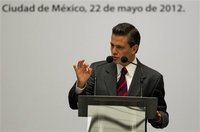USA prepares open intervention in Mexico?
The closer the presidential elections in Mexico, the more brazen is the campaign on television and in the media, designed to convince voters that the polls by a wide margin are led by the new protégé of the U.S. State Department, Enrique Peña Nieto. However, a preliminary vote in the largest universities in the country showed that the number of votes for the leftist candidate Andres Manuel Lopez Obrador is 85 percent. Lopez Obrador in his election campaign is betting on politically active young people and social networks. In its form it is similar to the "Arab spring", but in essence it is very different.

Mexico is a major U.S. foothold in Latin America and the only country in the region that, without limitation, lost its sovereignty under the pressure of its aggressive policy. The direct control of the territories of Canada and Mexico is discussed in the statutes of the so-called "Northern Command", created in October of 2002.
The document states that all of North America from Alaska to the Mexican state of Chiapas is under the unified command of the Pentagon. In everyday life, the U.S. rules the country through the representation of the DEA and other special services under the pretext of combating drug trafficking, blackmailing with strengthening of immigration laws. Over 12 million Mexicans reside in the U.S.
Making sure that the candidate of the ruling National Action Party (PAN) Hozefina Vazquez Mota will lose in the first round of the elections on July 1, the United States made a bet on the leader of another right Institutional Revolutionary Party (PIR). Much is at stake: if Lopez Obrador wins, the plan Merida, supposedly coordinating the fight against drug trafficking and organized crime, and in fact controlling nearly all spheres of the government, will be threatened.
Therefore, to ensure the victory of Peña Nieto, television and the media got involved. Public opinion polls where Peña Nieto leads by a margin of 20 points, are being broadcasted. However, the real numbers show Nieto's advantage of only eight to nine points with recent negative changes. He contributed to this once he could not name the authors of three books that influenced his life, the price of tortillas and was grossly mistaken when estimating subsistence level, reducing it by half.
Of course, it was necessary to imporve the image of "the new president of Mexico," as the U.S. calls him, so Peña was asked to speak against the prospect of legalizing drugs to tackle drug-related crime. However, it is clear to everyone that in domestic policy he will continue the liberal policy of President Calderon, who for four years of his reign, according to the Center for Economic Analysis of the Department of the National Autonomous University of Mexico, led to an increase in unemployment from 6.5 to 8.7 million.
López Obrador who leads the National Revival Movement of the left (Movimiento Regeneración Nacional - MRN) has the opposite position. If he becomes president, he will join the leftist governments of Brazil, Argentina, Peru, and will become an ally of the more radical left-wing bloc of ALBA. In 2006, Washington decided to challenge López Obrador by falsifying the election results. Undoubtedly, this will be done now. The price of the issue is too high.
So far, everything is done in order to discredit Obrador. In the media he is presented as a "secret admirer of Chávez." Meanwhile, his program is a real alternative, and has a different solution for the problem of combating drug trafficking that costs Mexico 50,000 lives. Lopez Obrador rejects the current strategy of the "war on drug cartels," used by Washington and the Calderon government to justify the use of the U.S. Army in the Mexican territory.
The fight against drug crime will be continued by the police and other specific and relevant bodies. Obrador promises to invalidate the agreements of the administration of Calderon with the U.S. humiliating to the national sovereignty, in particular, the plan of Merida. He opposes the privatization of Petroleos Mexicanos, advocates for the "sovereignty" of food and the creation of seven thousand jobs for young professionals.
Ignored by television, Lopez Obrador has adopted social networks. On his appeal on Sunday, May 20, rallies and marches took place not only in major cities in Mexico, but also in Argentina, Germany, Australia, Belgium, Brazil, Canada, Chile, Cuba, Spain, and the United States. Preliminary elections were conducted in the largest universities of the country that showed that young people support Obrador by a margin of 80-85 percent.
Another evidence of his strength is the fact that the National Security Committee of the House of Representatives in the U.S. Congress held a meeting on the impact of possible changes in strategy by the next president of Mexico. The U.S. experts do not rule it out. "This would be a very serious blow to the efforts we have made over the past six years in the government of Felipe Calderon," said DEA Special Agent Douglas Coleman.
The fate of Mexico will depend on the activity of the young voters who have always been passive in the past. This is 14 million people, of which 3.5 million will vote for the first time. The U.S. should keep Mexico at whatever cost, and if the peaceful solution does not work, a pretext for an invasion is being prepared.
On April 3 at the summit of North America (United States, Mexico and Canada), President Obama said: "We see the increasing power of those involved in drug trafficking in the countries close to us. I think we should be concerned with what's happening in Mexico and Central America, because when there are families, women and innocent children who are shot on the streets, that's everyone's problem, not just their problem." What is this if not an occasion for an open U.S. intervention in Mexico?
Natalia Sinitsa
Lyuba Lulko
Subscribe to Pravda.Ru Telegram channel, Facebook, RSS!




